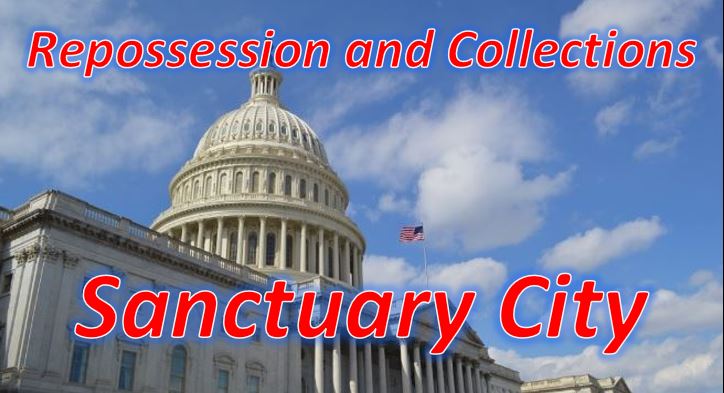
Washington DC Mayor Muriel Bowser’s third extension of her “Public Health Emergency” powers was set to expire July 25th and their “Repossession and Collections Sanctuary City” status was about to come to an end. Cape flowing in the breeze, Democratic Councilman Phil Mendelson has come to the rescue and introduced a trio of new collections and repossession related bills and a resolution. Washington D.C. Council Resolution 240338 extends the repossession and collections moratoriums another “225 Days after taking affect.”
The three resolutions are practically identical and spell out additional disclosure and debt validation requirements and penalties. Adding to the redundancy, all three resolutions are partially titled “Protecting Consumers from Unjust Debt Collection Practices.”
Council Bill 240357 – Protecting Consumers from Unjust Debt Collection Practices Amendment Act of 2021
Council Bill 240347 –
Protecting Consumers from Unjust Debt Collection Practices Emergency Amendment Act of 2021
Council Resolution 240338 – Protecting Consumers from Unjust Debt Collection Practices Emergency Declaration Resolution of 2021
Council Bill 240348 – Protecting Consumers from Unjust Debt Collection Practices Temporary Amendment Act of 2021
One interesting piece of data provided in resolution bill #240338, page 2, line 40 reads; (2) According to data from the New York Federal Reserve Bank Consumer Credit Panel/Equifax, auto loan delinquency in the District was at 10.35% as of the last quarter of 2020, higher than any point during the Great Recession.
What makes this so interesting, is that, according to Experian’s 11th annual State of Credit report, nationally, auto loan delinquency was actually lower by as much as 3% across all delinquency tranches days 30-180 when comparing 2019 to 2020. The highest tranche was Average 90 – 180 days past due was only 3.80%. If this data point is correct, DC is a bigger financial wreck than many may assume, which is also odd, because in the same report, neither Maryland, nor DC showed in the bottom five of states with the lowest credit scores.
In a joint legislative announcement on the same day, Mendelson, the chairman of the D.C. Council, and Karl Racine, the Attorney General of Washington, D.C., advised that these temporary resolutions are mere precursors to permanent legislation coming “in the near future.” that will propose “permanent updates to modernize the District’s debt collection laws in the long-term,”
“Our current debt collection law was passed 50 years ago and must be updated to address modern forms of communication and combat abusive debt collection practices.” Mendelson
“According to a pre-pandemic analysis by the Urban Institute, nearly 30% of DC residents have debt in collections, and those residents are disproportionately people of color. When debt goes to collections, the individual who owes money is often repeatedly contacted by debt collectors, who use a variety of tactics—including some that may be aggressive or misleading—in an attempt to get paid. In recent years, DC has also seen a significant increase in the use of lawsuits to collect debts. These lawsuits can lead to serious consequences for individuals who are already struggling, including loss of drivers’ licenses, seizure of bank accounts, or garnishment of already-low wages, and can increase the risks of homelessness and unemployment.”
Back on May 27th 2021, Democratic Councilman Phil Mendelson introduced Washington D.C. Council Bill 24-257, aka; The “Coronavirus Support Congressional Review Emergency Amendment Act of 2021.“ Buried within its 127 pages was a moratorium on automobile repossessions and most collections activity. With a completely Democrat controlled District Council, this bill swept through on a 13-0 vote.
Within the bill was the change in terms to what is deemed a “public health emergency” which was extended to mean a period of time for which the Mayor has declared a public health emergency pursuant to § 7-2304.01, or a state of emergency pursuant to § 28-4102.”.
During a public health emergency and for 60 days after its conclusion, no creditor or debt collector shall, with respect to any debt;
“(A) Initiate, file, or threaten to file any new collection lawsuit;
“(B) Initiate, threaten to initiate, or act upon any statutory remedy for the garnishment, seizure, attachment, or withholding of wages, earnings, property, or funds for the payment of a debt to a creditor;
“(C) Initiate, threaten to initiate, or act upon any statutory remedy for the repossession of any vehicle; except, that creditors or debt collectors may accept collateral that is voluntarily surrendered;
Considering potential cause and effect of hinderances to collections and recovery, it would not seem unreasonable that lenders would prefer not to lend in Washington DC. Of course, that would be “Redlining” and illegal.
This seems to create something of a conundrum for lenders in and around the Washington DC area. Lend and suffer, or run as far away from Washington DC as you can. It will be interesting to see how this all plays out in the future.










